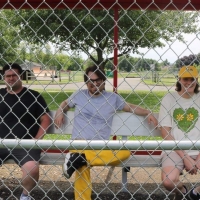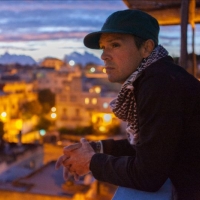For a band that was dreamt up in a hospital bed, indie-rock quartet E.R.I.E. certainly has a lot of life in them. After emergency heart surgery in the Fall of 2018, TJ Foster spent the following year writing and recording Don’t Wanna Live, Don’t Wanna Die in an attempt to not only reflect on the harrowing ordeals that brought him to that hospital room, but also to get back to his roots as a songwriter. And while that March 2020 debut effectively highlighted greatly personal, existential struggles with both mental and physical health, the group’s second LP, Suburban Mayhem, arrives with grander scope and vision. The album, due April 7th via Mint 400 Records, turns its focus externally, commenting vividly on the outside forces burrowing into our brains on a daily basis. It’s a resplendent examination of the world around us, rife with equal parts cynicism, wit and hope. Featuring pitch-perfect collaborations with Brooklyn-based dream-pop trio ALMA, and fellow Albany, NY area songwriter Sydney Worthley, the record showcases a band not only finding their footing, but settling into a signature sound. All the while, E.R.I.E. has solidified themselves as one of the most reliable and entertaining live acts in the greater Albany, NY music scene. With every performance brimming with energy, vulnerability and appreciation, the band is poised to become a suburban success story. We caught up with the band to talk about the new record.
Your first record notably came out of a rather personally harrowing place. It was rife with themes of mortality and existentialism, and your new record Suburban Mayhem seems to be coming from a different perspective. How did your approach differ between the two?
Levi Jennes (bass): This is the first record we have made as a unit, and we had a fair amount of latitude into what we thought would serve these songs best. We recorded these tunes at our own pace, and hashed out parts collectively. For me as a bass player, this was the first time I had some real control over my “sonic destiny,” which enabled me to try out a wide variety of gear to get the right tones for the record. While nothing really compares to being in a studio and focusing solely on getting amazing performances, we were really able to knock out that same level of performance, albeit spread out over close to a year!
Talk to me about the title Suburban Mayhem. Along with the album artwork itself, it invokes some pretty cool imagery. Where did it come from?
TJ Foster (vocals/guitar): The title is two-sided, sort of like Harvey Dent. The phrase conjured up memories of growing up in the suburbs, and our own little version of “raising hell”. When we’re young, our worlds are viewed through such a microscope and it’s easy to ignore what’s going on around you, globally. Fast forward 20 years or so, and now we’re adults, owning houses in our own little version of the suburbs. And the suburban mayhem that we’ve become susceptible to in recent years is avoiding the neighbors who have Trump paraphernalia on their front lawns, shit like that. I’m not saying it’s right, but that’s the world we live in right now. Division is everywhere, and our little communities where we would run free and wild in the summers have become a lot less open.
Matt Delgado (guitar): The title is also very literal, as it’s a direct reference to the structure of modern society. There was a lot of group discussion about the artwork and how to portray those elements in a thoughtful and accurate way. They were very conscious decisions. Neil at our label Mint 400 Records knocked it out of the park.
The album seems to reference the “good old days” quite a bit both directly (e.g. ‘Don’t Wait For the Sun’) and indirectly (e.g. ‘Suburban Mayhem’), but it does so in a way that feels very earnest and not through a rosy colored lens. Tell me about the role nostalgia tends to play in your music.
LJ: We were discussing this the other day, and there is a certain element of nostalgia that plays through the songs, but it is exactly that: we are now adults, and realize that even when we were young, things were not always rosy. Granted, when we were kids we were getting up to “mayhem,” but like kid mayhem (riding bikes, neighborhood-wide games of capture the flag, etc.). We were friends with everyone. Now that we are older, it’s a realization that you don’t want to be friends with everyone, but you kind of need to get along, but maybe everyone doesn’t want to get along? So the songs reflect the kind of music we all loved as kids (in our own special way), but lyrically looking at how the world is not always sunshine and rainbows. Also, I love Geddy Lee, so hopefully my bass tone oozes nostalgia, ha!
MD: As the album developed, it really started to remind me of the Stoic philosophers - particularly Seneca - in that, it highlighted the value of reflection (good/bad/ugly). When you’re calling out questionable actors, as we do in “Bad Man’s World,” there is an opportunity to turn the camera around and look backwards inwardly, assess our own experiences, and consciously decide what our future actions can look like. That ends up somewhat referenced in the title track at the end of the album. Nostalgia is the distance and perspective that time affords us, and it can be a powerful tool.
There seem to be a lot of important messages within this record - is there anything in particular you hope listeners take away from it?
LJ: There are a lot of heavy themes on the record, but I think “Oh Well” and “Suburban Mayhem” really sum it up: everything is going to hell, but make the most of it ‘cause we’re all dying anyway. And I think the upbeat music against the heavy lyrical themes really drive that dichotomy home.
MD: To Levi’s point, those two songs are bookends, with the other ten tracks representing the living we do in between. And life can be heavy.
In the title track, you look back on ‘standing outside the show, trying to get everyone inside…’ - how would you compare performing in a scene now versus this timeframe you reference?
TF: I like to think of this song as my ode to pop-punk, and to my roots in that scene. I grew up in suburban Connecticut, and we actually had a really cool community of bands. I have fond memories of playing VFW halls and basement shows. Most of the time, there was the chaotic rush of running outside five minutes before you were about to go on and urging everyone to come inside and watch you play.
Was there any song that was particularly difficult to make relative to the rest?
LJ: That’s tough to say, I think we each had a different song that maybe didn’t gel for that individual at a given point in time. As time went on, someone would revisit songs individually, or paired up with TJ, and record something that turned the whole vibe around (if that makes any sense). And then what may have seemed like a chore became “F*** yea, let’s do this!”
It’s been almost three years - and a full global pandemic - since you released your first record. What sorts of emotions are going through the band now that you’re on the precipice of finally getting this album out there?
MD: Honestly, we’re just excited to have a more traditional release trajectory. Our debut album came out within a week or so of the shutdowns. We were lucky enough to have a virtual release thanks to a great local organization, but it was largely overshadowed by the new reality we were living in. This time around, we’ve been able to promote the release, play the songs live in bars and clubs, shoot a couple music videos, and we get a proper release show on April 7th in Albany! We have had some of the best people support us through the lean pandemic days, and we’re so excited to be sharing Suburban Mayhem with them.
What are your plans once the record is released?
LJ: Play it to anyone who will listen, even if they don’t want to listen to it!
TF: I think I speak for all of us when I say this is the most we’ve ever been of a musical output. So the plan is really to just keep putting in as much work as we can, and hope it pays off! Whatever that means.
Lastly, for each of you individually, what is your go-to “pump-up” song for the van?
TF: “I Believe in a Thing Called Love” by The Darkness. (Let it be known there was zero hesitation in my selection)
LJ: Ooo, there are so many! If I had to pick one, it would be “Wu-tang Clan Ain’t Nuthing ta F’ Wit’”.
MD: “Through The Fire and Flames” by Dragonforce.




